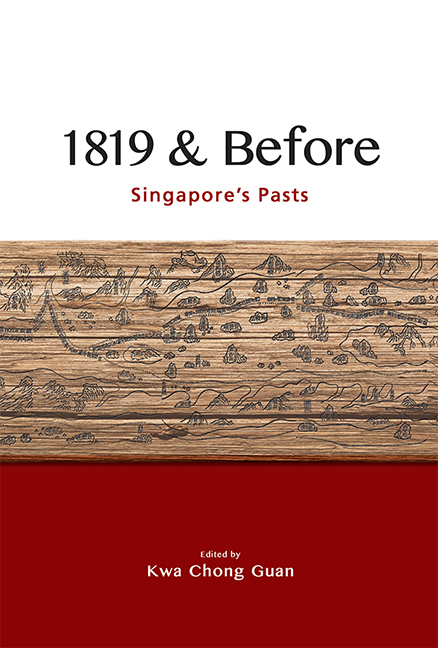Book contents
- Frontmatter
- Contents
- Foreword
- Acknowledgments
- Contributors
- 1 Introduction: Approaches to Singapore’s Past before 1819
- 2 Issues and Approaches to Studying Singapore before 1819
- 3 Regional Influences, International Geopolitics and Environmental Factors in the Rise and Demise of Temasek
- 4 The Mysterious Malay Jong and Other Temasek Shipping
- 5 The Orang Laut and the Negara Selat (Realm of the Straits)
- 6 Avoidance of Shipwreck in the Malay Annals: A Trope in Buddhist Narratives of Maritime Crossings
- 7 The Inception of Lion City
- 8 A Note on Amoghapāśa-Lokeśvara in Singapura
- 9 Portuguese and Dutch Records for Singapore before 1819: An Overview
- 10 Zheng He’s Navigation Methods and His Visit to Longyamen, Singapore
- Bibliography
- Index
9 - Portuguese and Dutch Records for Singapore before 1819: An Overview
Published online by Cambridge University Press: 09 October 2021
- Frontmatter
- Contents
- Foreword
- Acknowledgments
- Contributors
- 1 Introduction: Approaches to Singapore’s Past before 1819
- 2 Issues and Approaches to Studying Singapore before 1819
- 3 Regional Influences, International Geopolitics and Environmental Factors in the Rise and Demise of Temasek
- 4 The Mysterious Malay Jong and Other Temasek Shipping
- 5 The Orang Laut and the Negara Selat (Realm of the Straits)
- 6 Avoidance of Shipwreck in the Malay Annals: A Trope in Buddhist Narratives of Maritime Crossings
- 7 The Inception of Lion City
- 8 A Note on Amoghapāśa-Lokeśvara in Singapura
- 9 Portuguese and Dutch Records for Singapore before 1819: An Overview
- 10 Zheng He’s Navigation Methods and His Visit to Longyamen, Singapore
- Bibliography
- Index
Summary
This essay aims to provide a synopsis of the different types of sources that are available for the study of the history of Singapore in the period before circa 1800. The objective is not to provide a reconstruction of Singapore history as such, but rather to provide general comments and analyse the sources at hand. This chapter offers an opportunity to step back and share with you the experience I have gathered in identifying, handling and working with different types of sources over the past two decades. In this chapter I will take a closer look at what those different types of sources are able to inform, what their limitations are, and what they generally do not tell us. As the title suggests, the focus of the present expose is placed on Portuguese and Dutch textual materials broadly defined. This includes manuscript and published sources as well as cartographic specimens that touch on the island of Singapore, its surrounding waters, and the southern stretches of the Malay Peninsula.
Clearly, I am aware that I am not the first to work on these materials, specifically on Portuguese texts. Investigations were already conducted in the 1950s by Ian Alastair Macgregor at the History Department of the University of Singapore. Almost concurrently, Carl Alexander Gibson-Hill, the former director of the Raffles Museum of Singapore, was studying archaeological evidence, published travelogues and historical cartography. These two researchers made important contributions to the study at that point in time when access to primary sources dating from the early modern period (either in printed form or manuscript) was far more cumbersome and limited than it is today. Much later, in the 1990s, Paulo Pinto published a study, first in Portuguese and later in an updated English translation. He has mined the Portuguese sources to explore the relationship of the Portuguese with Aceh and Johor during the second half of the sixteenth and the opening two decades of the seventeenth centuries. This latter work, however, does not substantially touch on Singapore, and has failed to take into consideration certain Dutch and German language documents from the period under review. Its value is therefore somewhat limited.
- Type
- Chapter
- Information
- 1819 & BeforeSingapore's Pasts, pp. 89 - 100Publisher: ISEAS–Yusof Ishak InstitutePrint publication year: 2021



